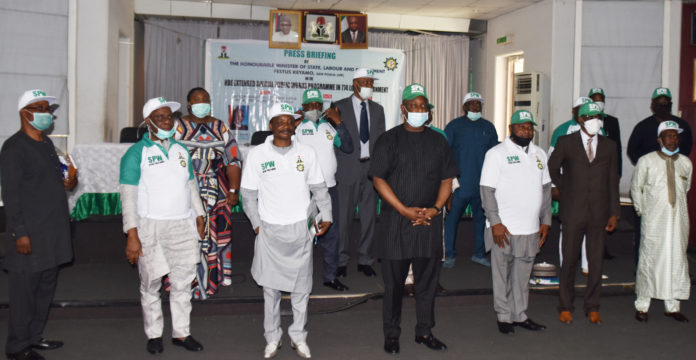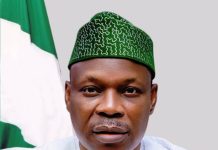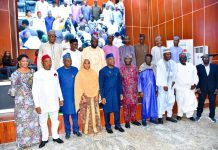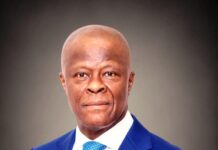The Federal Government is set to constitute special committees in each state of the Federation to deliberate, select and recommend persons to be engaged for the Extended Special Public Works programme in the states.
The Committees, to be known as State Selection Committees, would select 1,000 persons from each of the Local Government Areas (LGA) in each state, as well as identify the projects to be executed in those Areas.
Minister of State for Labour and Employment, Festus Keyamo, SAN, disclosed this in Abuja while briefing the Media on the Extended Special Public Works Programme approved by President Muhammadu Buhari for the Selection of 1000 Persons each from all the 774 Local Government Areas for temporary employment during the dry season.
According to the Minister, the President recently approved the extension of the Special Public Works programme to “all 36 states and the FCT from October – December 2020 as a means of mitigating the effect of the Covid-19 pandemic on the economy.”
He further stated that the extended programme would also be expected to “provide modest stipends for itinerant workers to undertake roads’ rehabilitation and social housing construction, urban and rural sanitation, health extension and other critical services. Hence the directive of Mr President for the National Directorate of Employment (NDE) to collaborate with other Ministries with rural components in their mandates.”
Keyamo recalled that President Muhammadu Buhari had previously, in October 2019, approved a pilot scheme of the Special Public Works programme, for implementation by the National Directorate of Employment (NDE) in five Local Government Areas in each of the eight pilot states of Adamawa, Borno, Ebonyi, Edo, Ekiti, Jigawa, Katsina and Kwara.
According to him, the pilot scheme, an employment creation drive, which has since been concluded, was designed to “mitigate lack of job opportunity in the rural areas through short term engagement of one thousand (1000) unemployed persons per Local Government Area (LGA) for a period of three (3) months,” with a payment of N20,000 monthly allowance to the beneficiaries.
He said that the special public works, a dry season/off season transient job programme, originally designed for the rehabilitation/maintenance of public and social infrastructure, was mainly for unskilled persons resident in those rural areas.
Though the Minister had on Wednesday, 29th April, 2020 inaugurated an Inter-Ministerial Committee on Extended Special Public Work to devise a strategy for the implementation of that programme, he explained that the idea of setting up State Selection Committees was borne out of the belief that the selection of the beneficiaries and projects should be a wholly local affair.
According to him, each State Committee would consist of twenty members as follows: a Chairman and Vice-Chairman who should be indigenes or residents of that State; a Secretary who would be the State Co-ordinator of the NDE of that State; one representative of the Governor of that State; the State Chairmen of the Christian Association of Nigeria, the Nigerian Supreme Council for Islamic Affairs, and the National Union of Road Transport workers or their representatives/nominees.
The rest are: “the market women leader in that State; three persons (one from each Senatorial District) representing the traditional institutions in that State; two persons (one male and one female) from each of the Senatorial District of that State (that is six persons), representing prominent youth organisations in that States; a representative of a prominent Civil Society Organisation of that State, and two persons representing some peculiar interests in those States”, he added.
He noted that a website would be developed immediately where the public could access information on the composition and contact of the Selection Committees, list of the selected beneficiaries and chosen projects.
Keyamo further stated that select banks would be used to register and collate data of the beneficiaries, as well as open accounts for them, while all payments would be made from the Central Bank of Nigeria (CBN) directly to the accounts of beneficiaries.
The Minister said that the data to be collected would also be used for other purposes relating to employment and social survey, disclosing that the National Bureau of Statistics had already requested for “an allotment of ten persons each from the 1,000 persons in each Local Government Area to carry out special social surveys and data collation by the Bureau.”
Keyamo described the programme as “one of the biggest social intervention schemes to be carried out within a short period of time by any government in the history of Nigeria;” as well as “the very first direct employment scheme of any government that targets the very bottom of the economy. Other intervention programmes have been in form of empowerments.”
The Minister disclosed that the Extended Special Public Works programme would start on October 1st, while the State Selection Committees would be empaneled and empowered in the next few weeks to start the process of selection of beneficiaries and projects locally
Charles Akpan
Deputy Director/Head Press and Public Relations
2nd June, 2020






